John Warren is a USMC Captain and a former Marine infantry officer and successful entrepreneur. He is the cofounder and former CEO of Lima One Capital.
John Thompson is a USMC Master Sergeant and is the cofounder and former COO of Lima One Capital.
Below, John and John share 4 key insights from their new book, Lead Like a Marine: Run Towards a Challenge, Assemble Your Fireteam, and Win Your Next Battle. Listen to the audio version—read by the authors—in the Next Big Idea App.

1. Do everything for a reason.
This insight could just as easily have been called “use common sense,” or “think logically.” In Ramadi, we developed new and innovative tactics to defeat the insurgency there because traditional tactics weren’t working. We analyzed the problem and came up with simple solutions to solve it.
When we got out of the Marine Corps and started our new company, we quickly learned that we should never violate the principle of doing everything for a reason. Back in 2013, Lima One Capital was a very young company—originating about $3 million per month, with nine employees. We needed to raise a hundred million more in capital in order to expand. An investment banker had organized a meeting with billionaire William Erby in Miami. Before going into the meeting, he warned us that it would seem arrogant and naïve if we told Erbey that our five-year goal was originating $1 billion in annual loans. He said that projecting such massive growth would look too aggressive.
“Why not be honest about our big ambitions, if we had a plan to back them up?”
This didn’t make much sense to us. Why not be honest about our big ambitions, if we had a plan to back them up? But if this was how the game was played, so be it. We agreed to sound modest if Erbey asked how big we wanted to grow. When we got to his office, we found that Erbey was clearly a no-nonsense guy, in his beautiful designer suit, suspenders, and tie. His operational questions showed that he had read our pitch book carefully.
We were well prepared with all our answers. Then, as our half-hour slot was nearly over, he said, “I’m really interested in Lima One. Just one more question—how big do you think you can get in the next five years?” I glanced at our investment banker, who responded with a subtle head shake: don’t do it! I looked back to Erbey and replied, “We want to grow Lima One into a premier lending company that originates five hundred million dollars in loans annually.” At that point Erbey closed our pitch book, leaned in, and looked at us. “Well, guys, this has been a great meeting, but at my level, I can’t waste my time on any business that’s not aiming higher. I only invest in lenders that can originate at least one billion dollars annually.”
We left empty-handed and somewhat stunned. We had violated our rule of doing everything for a reason.
2. Build a team of killers.
Putting together a great team is vital. We call it building a team of killers. What we mean by that is building a team of people who possess killer performance, killer focus, killer clarity of purpose, killer commitment to the mission, and killer loyalty to each other.
One of the questions we are most often asked is: what are the most important traits of a good leader? In our experience, a true leader must possess three characteristics—strong core values, competence, and courage.
Core values: Does the leader have integrity, a drive for excellence, a mission-focused mentality, and a servant heart?
Competence: Does the person have the skill set to get the job done?
Courage: Are they willing to do the right thing, the tough thing, regardless of the costs to them personally?
If a person does not possess all three of these characteristics, they will inherently fail as a leader.
3. Eat last.
In most branches of the military, and throughout our society, eating first is a perk of having seniority. But in the Marine Corps, whether at a U.S. base or on a combat deployment, you’ll see the opposite sequence.
The enlisted get their food first, followed by NCOs, junior officers, and senior officers. The commanding officer eats last—or if there is a food shortage—not at all. This tradition might seem minor, but it is a way the Marines stress that leadership is a responsibility, not a privilege.
In the Marines, it’s all about a leader sacrificing to fulfill the mission and take care of his people. At its core, eating last is really about servant leadership, a biblical principle that teaches us to serve others before we serve ourselves.
4. Lead from the front.
We want to end on a story that includes someone who exemplifies Marine Leadership. His name is Mike Oullette and he was one of my Marines. Mike joined our platoon in a boot drop, shortly before we left for Ramadi, Iraq in March of 2006.
Unlike my seasoned Marines who had just returned from Fallujah, most of the new Marines or “boots,” as we called them, looked very green and nervous—similar to 2nd Lieutenants. Mike, on the other hand, had this chiseled face that caused him to look strong and serious. It didn’t take him long to earn the nickname, “Super Boot.” During our seven-month deployment to Ramadi, Mike performed well in combat and never let any of his fellow Marines down.
“In the Marines, it’s all about a leader sacrificing to fulfill the mission and take care of his people.”
Three years later, Mike had been promoted to the best billet in the Marine Corps—that of infantry squad leader. On March 9th, 2009 he led his 13 Marines on a patrolling mission in the Nowzad District of Afghanistan. Ambushed by enemy fighters, an IED exploded beneath him, severing one of his legs, and shredding his other leg. His Navy Cross citation describes what happened next:
“Following the explosion, Corporal Oulette directed his squad to prepare a hasty defense while helping to treat his own injuries. Moments later, enemy fighters opened fire on his squad with assault rifles and machine guns from point-blank range.
Even as a Corpsman worked to stem his massive bleeding, Corporal Ouellette continued to direct the fire of his squad. When attack helicopters arrived, he coolly talked his radio operator through the employment of the aircraft as they made repeated strafing runs within 20 meters of the squad’s position.
These expertly-applied fires suppressed the enemy long enough for a fire team to link up with reinforcements and bring them forward to Corporal Ouellette’s position. He held that position and continued to give orders to his squad as they fought, allowing himself to be evacuated only when the entire squad was ready to move out of the area. He continued to give directions to his team leader up until he was loaded into a medical evacuation helicopter, where he soon lost consciousness.”
Mike died shortly after, but his heroism and sacrifice continue to live. We share Mike’s story often because we want you to know the men and women we have serving in the military and protecting us. We share Mike’s story because he lived every one of the principles we discuss in Lead Like a Marine. In a world full of people who lead from the rear, Mike always led from the front.
The U.S. Marines Corps is the greatest fighting force on the planet. But it’s so much more than that: it’s a factory for producing first-rate leaders, problem-solvers, and innovators.
To listen to the audio version read by co-authors John Warren and John Thompson, download the Next Big Idea App today:































